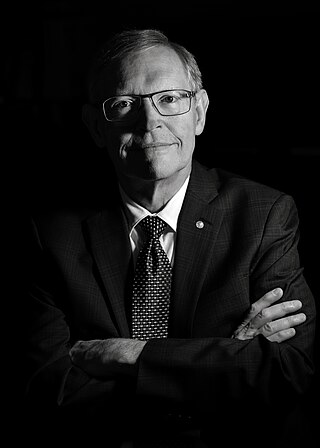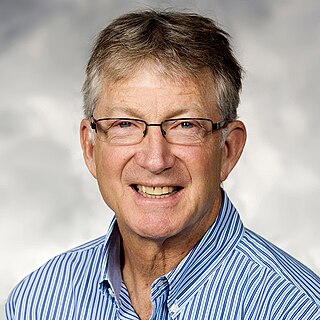
Lawrence James DeLucas is an American biochemist who flew aboard NASA Space Shuttle mission STS-50 as a Payload Specialist. He was born on July 11, 1950, in Syracuse, New York, and is currently married with three children. His recreational interests include basketball, scuba diving, bowling, model airplanes, astronomy and reading.

Alexander Pines is an American chemist. He is the Glenn T. Seaborg Professor Emeritus, University of California, Berkeley, Chancellor's Professor Emeritus and Professor of the Graduate School, University of California, Berkeley, and a member of the California Institute for Quantitative Biosciences (QB3) and the Department of Bioengineering. He was born in 1945, grew up in Bulawayo in Southern Rhodesia and studied undergraduate mathematics and chemistry in Israel at Hebrew University of Jerusalem. Coming to the United States in 1968, Pines obtained his Ph.D. in chemical physics at M.I.T. in 1972 and joined the UC Berkeley faculty later that year.

Mark Stephen Wrighton is an American academic and chemist who is President Emeritus of George Washington University and has been serving as Chancellor Emeritus of Washington University in St. Louis since May 2019 after serving as the 14th Chancellor of Washington University in St. Louis from 1995 to 2019. He was also appointed by Washington University in St. Louis as the inaugural holder of the James and Mary Wertsch Distinguished University Professorship in August 2020. From January 2022 to June 2023, Wrighton took a sabbatical leave from WUSTL to serve as the interim president of The George Washington University while GWU conducted a presidential search for a replacement for president Thomas LeBlanc.

The President's Council of Advisors on Science and Technology (PCAST) is a council, chartered in each administration with a broad mandate to advise the president of the United States on science and technology. The current PCAST was established by Executive Order 13226 on September 30, 2001, by George W. Bush, was re-chartered by Barack Obama's April 21, 2010, Executive Order 13539, by Donald Trump's October 22, 2019, Executive Order 13895, and by Joe Biden's February 1, 2021, Executive Order 14007.

William Esco Moerner, also known as W. E. Moerner, is an American physical chemist and chemical physicist with current work in the biophysics and imaging of single molecules. He is credited with achieving the first optical detection and spectroscopy of a single molecule in condensed phases, along with his postdoc, Lothar Kador. Optical study of single molecules has subsequently become a widely used single-molecule experiment in chemistry, physics and biology. In 2014, he was awarded the Nobel Prize in Chemistry.

Gerald L. Curtis is an American academic and political scientist interested in comparative politics, Japanese politics, and U.S.-Japan relations.
Michael A. Wartell is chancellor emeritus of Indiana University-Purdue University Fort Wayne (IPFW), where he served as the eighth chancellor from 1994 to 2012. His 18 years of service was the longest tenure of any previous chancellor. Prior to this appointment, he served as IPFW's vice chancellor for academic affairs for one year.
Robert Coombe is a chemist and an educator. He has been a faculty member at the University of Denver since 1981. From 2005 until 2014 he was chancellor.

Daniel L. Ritchie is the Chancellor Emeritus of the University of Denver, a former CEO of major communication corporations, and a Harvard alumnus. He hails from China Grove, North Carolina and has moved around the country from coast to coast before eventually settling in Denver, Colorado.
Edward I. Solomon is the Monroe E. Spaght Professor of Chemistry at Stanford University. He is an elected member of the United States National Academy of Sciences, a Fellow of the American Association for the Advancement of Science, and a Fellow of the American Academy of Arts and Sciences. He has been profiled in the Proceedings of the National Academy of Sciences. He has also been a longtime collaborator with many scientists, including Professor Kenneth D. Karlin at Johns Hopkins University.
Paul J. Gemperline is an American analytical chemist and chemometrician. He is a Distinguished Professor of Chemistry at East Carolina University (ECU) located in Greenville, North Carolina and has been the recipient of several scientific awards, including the 2003 Eastern Analytical Symposium Award in Chemometrics. He is author of more than 60 publications in the field of chemometrics. Dr. Gemperline served as Dean of the Graduate School at ECU from 2008 to 2022. He retired from ECU June 30, 2022 and is now professor emeritus.

Donald Gene Truhlar is an American scientist working in theoretical and computational chemistry and chemical physics with special emphases on quantum mechanics and chemical dynamics.
Dipankar Das Sarma, popularly known as D.D. Sarma, is an Indian scientist and structural chemist, known for his researches in the fields of Solid State Chemistry, Spectroscopy, Condensed Matter Physics, Materials Science, and Nanoscience. He is a former MLS Chair Professor of Physics and Chairman of the Centre for Advanced Materials and the GAST Professor of Uppsala University, Sweden, A recipient of TWAS Physics Prize and the UNESCO Biennial Javed Husain Prize, Sarma was honored by the Council for Scientific and Industrial Research (CSIR), Government of India, in 1994, with the Shanti Swarup Bhatnagar Prize for Science and Technology.
Chester M. Alter (1906–2006) served as the twelfth Chancellor at the University of Denver (DU) from 1953 to 1967. He was a scientist and an educator. He worked on the Manhattan Project during World War II.

Charles Vernon (Chuck) Shank is an American physicist, best known as the director of the Lawrence Berkeley National Laboratory from 1989 to 2004.
John E. Dowling is an American neuroscientist and Gordon and Llura Gund Research Professor of Neurosciences at Harvard University. He is best known for his seminal work in vision science, having elucidated the biochemistry of rhodopsin and development of the vertebrate retina, as well as diseases that affect vision such as vitamin A deficiency and retinitis pigmentosa. He was elected to the American Academy of Arts and Sciences in 1972, the National Academy of Sciences in 1976, and the American Philosophical Society in 1992.
Jeanette Grasselli Brown is an American analytical chemist and spectroscopist who is known for her work with Standard Oil of Ohio as an industrial researcher in the field of spectroscopy.

James L. Skinner is an American theoretical chemist. He is the Joseph O. and Elizabeth S. Hirschfelder Professor Emeritus at the University Wisconsin-Madison. He is also a member of the Scientific Advisory Board of the Welch Foundation. Most recently, Skinner was the Crown Family Professor of Molecular Engineering, professor of chemistry, director of the Water Research Initiative and deputy dean for faculty affairs of the Pritzker School of Molecular Engineering at the University of Chicago. Skinner is recognized for his contributions to the fields of theoretical chemistry, nonequilibrium statistical mechanics, linear and nonlinear spectroscopy of liquids, amorphous and crystalline solids, surfaces, proteins, and supercritical fluids. Skinner is the co-author of over 230 peer-reviewed research articles.
Sue Brannon Clark is an environmental radiochemist. Since receiving her doctorate in inorganic and radiochemistry from Florida State University in 1989, Clark has worked at Washington State University where she leads a research team on the chemistry and chemical engineering of processing nuclear materials. She has also held various leadership roles at WSU, including serving as interim vice chancellor for academic affairs and interim dean of the college of sciences.









